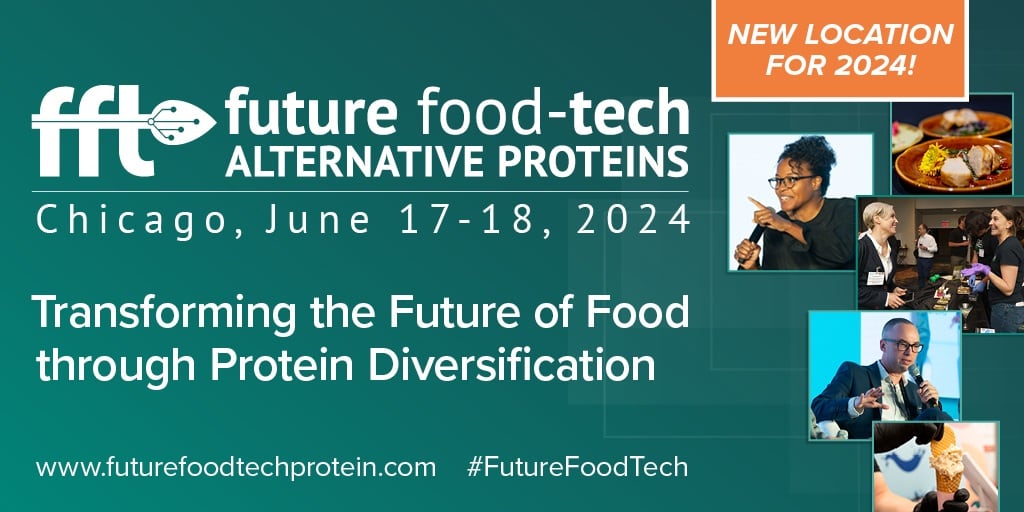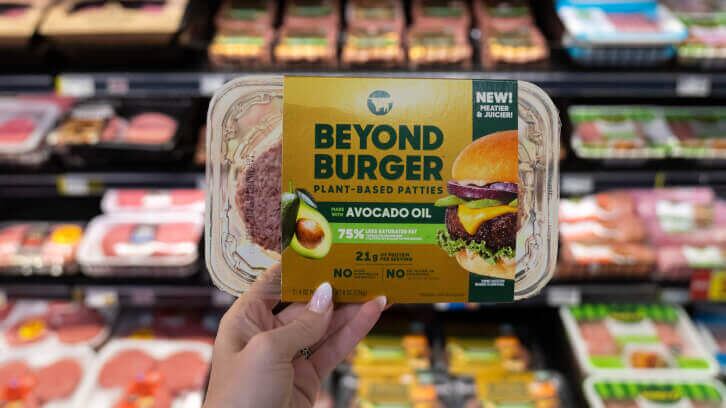With billions invested into the alternative protein industry, the industry continues to evolve ingredients, production processes and final products, said Audrey Spence, startup innovation lead at Good Food Institute during the State of Alternative Proteins panel.
Despite consumer concerns over ingredient processing and premium pricing, the plant-based category, which is expected to reach $160bn in sales by 2030, continues to hold its ground with a 30% increase in plant-based claims between 2018 and 2022, according to Mintel data.
While health, taste and flavor serve as key drivers for plant-based products, the category has struggled to compete with cost of its conventional counterparts. Plant-based foods can be twice as expensive as beef, four times as expensive as chicken and three times as expensive as pork per pound, according to Nielsen data by way of Good Food Institute’s report.
However, Good Food Institute predicts that the path to price parity is possible “as plant-based producers increasingly scale up production, achieve economies of scale and seek price parity with their conventional competitors.”
Delivering clean, sustainable ingredients is a cornerstone of the alternative protein and dairy categories
From the regenerative agroforestry perspective, jackfruit-based meat producer Karana works with local farmers and communities to grow the perennial tree crop which is ideal for intercropping and improving soil health and yields three to five times higher than wheat.
Karana’s co-founder and CEO, Dan Riegler, explained that while the company does not develop alternative proteins, its sustainably scaled jackfruit offers insights into delivering “real ingredients … in meaty, delicious formats and textures,” while providing whole plant fiber.
Additionally, Karana sells to food service and industrial channels, helping food companies and chefs make “end products out of jackfruit.”
From the mushroom space, Meati develops its meat-like filets by harvesting mushroom root that can be formed “into delicious whole cuts that are very similar to chicken breast or steak, but they are lean, high-quality nutrition [and] 98% mushroom root,” Founder Tyler Huggins, explained.
The company’s vertically integrated production takes place at its Mega Ranch industrial-scale facility. Huggins added that since Meati’s launch more than a year ago, it expects to be in “nearly 12,000” retail stores by the end of the year.
For Meati, its protein-dense and clean nutrition profile attracts its existing consumers and reaches 40% of consumers who are “new to plant-based,” Huggins said.
For TiNDLE, the company is “a super brand straddling multiple categories,” with its plant-based meat portfolio, explained Jean Madden, the company’s co-founder and CEO. TiNDLE currently offers its plant-based chicken and plant-based pork, in addition “to looking into other kinds of meat analogues,” she added.
While the company has grown in the global food service channel, TiNDLE is “starting our US retail journey now,” Madden said.
As technology around ingredient production continues to evolve, Madden noted that the alternative protein space is “not a hot flash in the pan.” While the sector has seen an overload of plant-based meat launches during the last three years, she predicts that only a few brands will make it to the top by consolidating “into these super brands, super categories.”
Tapping into existing plant-based milk drinkers who are ‘not content with current options’
With more than $3bn generated in revenue annually in the US, the milk alternative category is an area of opportunity for brands to expand their through innovative ingredients, formulas, packaging and communications.
Ben Berman, founder of dairy-alternative maker Tomorrow Farms, explained that for the alternative protein market to evolve, “you have to do well in the value chain,” particularly around food science and commercial infrastructure.
The company owns the animal-free dairy milk brand, Bored Cow, which uses precision fermentation and “a dairy-identical milk protein” to create a milk alternative that “is just like real dairy milk without the animal and lactose with 97% fewer carbon emissions,” he added.
Tomorrow Farms owns and operates its production and distribution, and partners with “with deep tech food science companies to get products on to the shelves and grocery stores,” Berman explained.
Berman noted that despite the health and environmental benefits of plant-based meat, the plant-based milk category “is less of a scary term.” He cited half of the market is “already drinking oat and almond and soy and pistachio [milk],” which has created space for Bored Cow to use fermentation to build a milk alternative that delivers on “taste, nutrition and functionality.”
Bored Cow intends to fill in the gap for existing plant-based milk drinkers who “are not content with the current options.” Leveraging its technology to produce milk protein from fermentation, Bored Cow also launched its yogurt using coconut cream and sugar to replace milk fat and lactose in traditional dairy yogurt and contains eight grams of protein.
TiNDLE’s parent company Next Gen Foods entered the plant-based milk category last year with its acquisition of plant-based startup Mwah! and showcased its Barista Oat Milk blend during the show.
Delivering solutions to consumers, retailers
Increased transparency and communication is another area of growth for the category, particularly around technology used by food scientists.
Berman noted that conveying the process and benefits of precision fermentation and biomass fermentation to consumers requires “a lot of heavy lifting,” on the front and back of pack.
For retailers, however, Bored Cow has flexibility to explain its value proposition by providing critical data points around sustainability, such as life cycle assessment data where “if you give us space on your shelf and we can convert 10% of your plant-based purchases to this, it is going to make this impact for … long term sustainability goals.”
Huggins added that whether a brand is pitching to consumers or retailers, it boils down to providing a solution. For consumers, “it is [about] how this product is going to make your life better, make it healthier, more vibrant,” while for retailers, “it is how you make [the category manager’s] life better,” and a brand’s approach to innovation.
He added, “It has been a tough couple of years and there has been decline. Any other bonuses and their success in their career are tied to how well their categories are doing. So, you need to offer them a solution. Are you going to increase sales for us?”
Since Meati launched in the natural channel for Whole Foods and Sprouts, the company saw “a nearly 2,000 basis point improvement” by launching in the plant-based section and “growing the category.”




